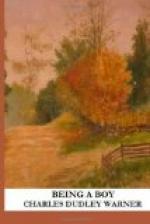What a refreshment is that water-spout! All day long there are pilgrims to it, and John likes nothing better than to watch them. Here comes a gray horse drawing a buggy with two men,—cattle buyers, probably. Out jumps a man, down goes the check-rein. What a good draught the nag takes! Here comes a long-stepping trotter in a sulky; man in a brown linen coat and wide-awake hat,—dissolute, horsey-looking man. They turn up, of course. Ah, there is an establishment he knows well: a sorrel horse and an old chaise. The sorrel horse scents the water afar off, and begins to turn up long before he reaches the trough, thrusting out his nose in anticipation of the coot sensation. No check to let down; he plunges his nose in nearly to his eyes in his haste to get at it. Two maiden ladies —unmistakably such, though they appear neither “anxious nor aimless” —within the scoop-top smile benevolently on the sorrel back. It is the deacon’s horse, a meeting-going nag, with a sedate, leisurely jog as he goes; and these are two of the “salt of the earth,”—the brevet rank of the women who stand and wait,—going down to the village store to dicker. There come two men in a hurry, horse driven up smartly and pulled up short; but as it is rising ground, and the horse does not easily reach the water with the wagon pulling back, the nervous man in the buggy hitches forward on his seat, as if that would carry the wagon a little ahead! Next, lumber-wagon with load of boards; horse wants to turn up, and driver switches him and




